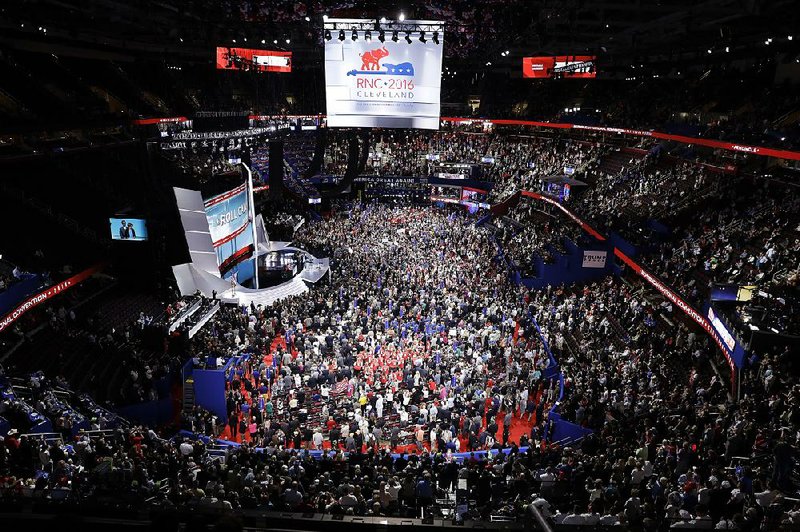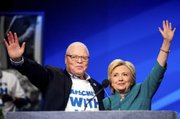CLEVELAND -- Republicans nominated Donald Trump on Tuesday as their presidential standard-bearer, propelling him into a November face-off with presumptive Democratic nominee Hillary Clinton.
FULL ELECTION COVERAGE
RELATED ARTICLES
http://www.arkansas…">In 50 seconds, state gets a plughttp://www.arkansas…">Hutchinson, Rutledge rip Clinton
"This is a movement, but we have to go all the way," Trump said in videotaped remarks beamed into the convention hall for the Republican National Convention in Cleveland.
There were flurries of dissent on the convention floor as states where Trump did not win in primaries recorded their votes for presidential nominee.
Trump formally reached the threshold of 1,237 delegates at 7:12 p.m., with votes cast by delegates from his home state of New York.
Trump's nomination-clinching votes were cast by his son Donald Trump Jr., who spoke for the New York delegation. Three of his other children joined the state's delegation on the convention floor.
"It is my honor to be able to throw Donald Trump over the top in the delegate count tonight," he said. "Congratulations, Dad, we love you!"
The convention then broke into applause, as a band played the Frank Sinatra tune "New York, New York," with the jumbotron in the Quicken Loans Arena displaying the words "Over the Top."
Soon after the night's roll call finished, House Speaker Paul Ryan declared Trump the winner of the Republican presidential nomination, recording that Trump received 1,725 delegates in the state-by-state roll call.
U.S. Sen. Ted Cruz of Texas was the runner-up with 475 delegates. Ohio Gov. John Kasich came in third with 129 votes, followed by 113 votes for Florida's U.S. Sen. Marco Rubio, seven for retired neurosurgeon Ben Carson, three for former Florida Gov. Jeb Bush, and two for U.S. Sen. Rand Paul of Kentucky.
Trump's name was formally entered into nomination by an early backer, Sen. Jeff Sessions of Alabama.
"He would not be silenced," Sessions said. "He spoke the truth. He gave voice to the people's concerns."
Sessions added, "He is a warrior and a winner."
Trump's nomination was then seconded by two other elected officials.
"It's time to take back our country," said Rep. Chris Collins of New York, the first House member to endorse Trump. He called the businessman "not merely a candidate. Donald Trump is a movement."
Then South Carolina Lt. Gov. Henry McMaster gave a speech that veered from unbridled happiness about Trump to deep pessimism about the state of the country Trump wants to lead.
"Weakness, decline, and ultimately, chaos and oblivion. We feel an eerie unease," McMaster said, describing the state of the nation under President Barack Obama. "But, ladies and gentlemen, that is about to change."
Trump is to formally accept the party's nomination Thursday.
McConnell and Christie
Later in Tuesday evening, Indiana Gov. Mike Pence was declared the vice presidential nominee by acclimation -- meaning no formal roll call vote was needed. That ruling came from Senate Majority Leader Mitch McConnell as he presided over the party's convention.
Pence, who is to accept the nomination when he speaks tonight, has the "overwhelming support of this convention" to be the next vice president, McConnell said.
After the nominations, two of Trump's former campaign rivals -- Carson and New Jersey Gov. Chris Christie, who both endorsed Trump after dropping out of the primary race -- took the stage to again vouch for the businessman.
Christie was one of the few speakers to energize the crowd, delivering a full-throated takedown of Clinton and imploring delegates to shout "Guilty!" as he ticked through numerous accusations of wrongdoing.
"We didn't disqualify Hillary Clinton to be president of the United States, the facts of her life and career disqualifies her," Christie said.
Ryan, who resisted calls to get into the presidential race, made a vigorous call for party unity with a message focusing more on the risks of letting Democrats keep the White House and make gains in Congress.
"Let's compete in every part of America, and turn out at the polls like every last vote matters, because it will," Ryan said, adding that Clinton represents a third term of Obama's presidency instead of the "clean break from a failed system" that many Americans want.
McConnell, who was greeted with a smattering of boos as he took the stage, also took aim at the Democratic candidate, saying Clinton has "a tortured relationship to the truth."
"I am here to tell you Hillary Clinton will say anything, do anything and be anything to get elected president," McConnell said.
McConnell assured the voters at home that Trump will sign bills to repeal Obama's health care law, build the Keystone pipeline expansion project and deny Planned Parenthood any federal money.
Two of Trump's children testified about his character, casting him as a man undeterred by challenges.
"For my father, impossible is just the starting point," said Trump Jr., the oldest of the Republican nominee's five children.
Tiffany Trump, the candidate's 22-year-old daughter with ex-wife Marla Maples, sprinkled her remarks with rarely heard anecdotes about her father, including the handwritten notes he left on her childhood report cards. She said she still has them.
"My dad is a natural-born encourager, the last person to ever tell you to lower your sights," she said.
A call for unity
Some delegates emphasized the need for a televised display of party unity after the divisive GOP primary. "United we stand, divided we fall," said Johnny McMahan, a Trump delegate from Arkansas.
But Colorado's Kendal Unruh, a leader of the anti-Trump forces, called the convention a "sham" and warned party leaders that their efforts to silence opposition would keep some Republicans on the sidelines in the fall campaign against Clinton.
This week's four-day convention is Trump's highest-profile opportunity to convince voters that he's better suited for the presidency than Clinton, who is expected to be officially nominated at next week's Democratic convention.
Clinton pounced on the GOP tumult, saying the Republican convention had so far been "surreal," comparing it to the film the Wizard of Oz.
"When you pull back the curtain, it was just Donald Trump with nothing to offer to the American people," Clinton said during a speech in Las Vegas.
Top Trump adviser Paul Manafort, a longtime Republican operative, has emerged as a controversial and pivotal figure in Trump's Cleveland operations. He led efforts to successfully tamp down a rebellion on the convention floor Monday, though the campaign still had to contend with angry outbursts from anti-Trump delegates.
The campaign chairman also upended Republicans' unity message by slamming Kasich in his home state. He called Kasich "petulant" and "embarrassing" for not endorsing Trump or attending the convention, drawing quick condemnation from other GOP leaders worried about angering the governor of a key electoral state.
Manafort, however, insisted that the convention was off to a great start.
Trump is "excited about the fact that his quest will finally come to an end and all of you who doubted that he could be the nominee will no longer be able to say 'Yes, but maybe it won't happen,'" Manafort told reporters.
Convention's first night
Monday's opening day of the Republican convention was marked by a noisy, though unsuccessful rebellion by a faction of delegates opposed to Trump's nomination who disrupted what normally would have been a pro forma vote on convention rules.
Later Monday, former New York Mayor Rudy Giuliani gave an exuberant speech that was among the best received in the arena, earning loud applause for his shouted denunciation of Islamic terrorists.
"What I did for New York, Donald Trump will do for America," he said.
But the fear among many Republicans was that the prime-time production Monday only superficially wallpapered over divisions within the party.
Republican delegates heard Monday night from a list of speakers who argued that Trump, a real estate developer and reality TV star, has the strength to confront the nation's security challenges.
Willie Robertson, the star of reality TV show Duck Dynasty, said Trump would have the backs of average Americans.
"He may not always tell you what you want to hear. You may not always agree, and it may not always be politically correct," he said. "But Donald Trump will always -- always -- tell you the truth as he sees it."
And Scott Baio, known for his role as Chachi Arcola on the sitcom Happy Days, said Trump could fix a country that's "in a bad spot right now."
"Is he a messiah? No, he's just a man," Baio said. "A man who wants to give back to his country."
Other speakers included Marcus Luttrell, a former Navy SEAL and author of the book Lone Survivor, and Pat Smith, the mother of one of the four Americans who died in the terrorist attack on a U.S. outpost in Benghazi, Libya, in 2012.
Smith received one of the loudest receptions of the night when she angrily denounced Clinton, saying she blamed the former secretary of state "personally for the death of my son."
"Hillary for prison," she said. "She deserves to be in stripes."
The low-wattage celebrities and two Marines involved in the Benghazi attack, who gave a disjointed and lengthy blow-by-blow account of their night under fire, also opened the convention to criticism that production fell short of Trump's promise in May to deliver a "spectacular convention" with top-tier entertainment.
The biggest political names to speak Monday evening were former Texas Gov. Rick Perry and U.S. Sen. Tom Cotton of Arkansas.
Their remarks stood in contrast to comments from other Republicans, who continued to offer only conditional support to their presumptive nominee. Ryan, the House speaker, told reporters at a Wall Street Journal lunch that Trump may be a conservative -- just "not my kind of conservative."
"I come from a different part and wing of the party," the Wisconsin Republican said. "There are different kinds of conservatives, that's for darn sure."
Despite discord within the party, the streets of Cleveland were mostly quiet on the first day of the convention, although protests were expected to intensify throughout this week.
Among the more spirited protest so far was a parade of more than 1,000 people that snaked from 45th and Superior down to 12th and Chester, close to the convention site. The protest featured a collection of groups that included the Black Lives Matter, activists against everything from racial bias and poverty to a more generalized anti-Trump sentiment. Others espoused socialism, environmentalism and campaign finance changes.
The parade was nonviolent, and one notable feature was the presence of cameras in the hands and on helmets of the marchers, and on the helmets of the body-armor-clad police officers who walked alongside the parade.
Information for this article was contributed by Julie Pace, Jonathan Lemire, Kathleen Hennessey and Steve Peoples of The Associated Press; by Karen Tumulty, Robert Costa, David A. Fahrenthold, Philip Rucker, Ed O'Keefe and Isaac Stanley-Becker of The Washington Post; by Noah Bierman of Tribune News Service; and by Justin Sink, Sahil Kapur, John McCormick, Mark Niquette, Jennifer Epstein, Elizabeth Wasserman, Ben Brody, and Jennifer Jacobs of Bloomberg News.
A Section on 07/20/2016

